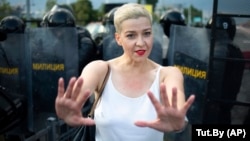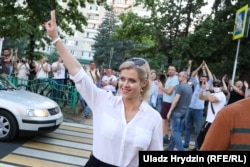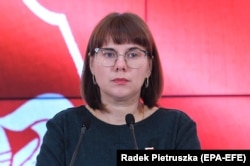After pledging that Belarusians "will never get tired" of demanding a peaceful change of power, Belarusian opposition activist Maryya Kalesnikava on September 7 mysteriously disappeared; reportedly, the victim of an abduction. After the departure of presidential candidate Svyatlana Tsikhanouskaya and political ally Veranika Tsapkala last month, she was the last of the three Belarusian women who had kick-started unprecedented national demonstrations for democratic change to remain within authoritarian Belarus.
Kalesnikava’s unexplained disappearance follows on the heels of nearly a month of widespread and often indiscriminate detentions of protesters, alleged police violence against detainees, crackdowns on critical media, and the summary arrest of some of President Alyaksandr Lukashenka’s most outspoken critics.
For some observers, it seemed only a matter of time before Kalesnikava, increasingly mooted as a potential magnet leader for demonstrations against Lukashenka's rule, was targeted as well. On September 6, other protest coordinators and she had joined in another march of thousands of Belarusians demonstrating nationwide against suspected fraud in Belarus' August 9 presidential vote and police violence against protesters and detainees.
Her disappearance occurred less than a day later.
One eyewitness told the independent Belarusian news service TUT.by, who first broke the story, that she saw masked individuals in civilian clothes bundling the 38-year-old Kalesnikava into a mini-van near Minsk’s National Museum of Art on the morning of September 7. One of the group stopped to pick up Kalesnikava's dropped phone before the van zoomed off, added the eyewitness, who gave her name as Anastasia.
In a later YouTube video, attorney Maksim Znak, a fellow management member of the Coordination Council for Belarus’ protests, stated that Kalesnikava had gone to the post office to pick up “some letter from the KGB” and an Interior Ministry document about charges for participating in an unauthorized demonstration.
Following TUT.by’s report, Znak recounted that “witnesses” had seen Kalesnikava put into a mini-van marked Svyaz (Communication) and driven off “in an unknown direction.”
“Since this moment, more than eight hours have passed, and we still do not know where Maryya is, nor what is happening with her,” he said.
Two other colleagues, Coordination Council spokesman Anton Rodinkov and Executive Secretary Ivan Kravtsov, who went to Kalesnikava’s apartment to look for her, are no longer answering their phones, he added.
As yet, the Interior Ministry and Investigative Committee, which handles pre-trial criminal investigations, have told news outlets that they have no information about Kalesnikava’s whereabouts.
The Minsk city police told the Russian state-run TASS news agency that they are verifying the information.
Belarus’ State Security Committee, or KGB, has not commented on the activist’s disappearance. State-run media outlets have not covered the disappearance report.
Speaking from outside Belarus, presidential candidate Svyatlana Tsikhanouskaya, who fled Belarus for Lithuania shortly after the August 9 presidential vote, charged that the “kidnapping” of the three is “an attempt to disrupt the work of the Coordination Council.”
“But this won’t stop us,” Tsikhanouskaya wrote on her Telegram channel, A Country For Life. “The more they intimidate, the more people will come out into the streets. We will continue the struggle. We will obtain the release of all political prisoners and the holding of new, honest elections.”
Police detained 633 people taking part in the nationwide “March of Unity” on September 6;363 will be held over for trial on charges of violating the law on public gatherings, according to the Interior Ministry.
With her blond buzz cut and flame-red lipstick, Kalesnikava, a professional flutist and non-profit art director, lately had become one of the most visible symbols of these protests.
On September 1, Kalesnikava told Current Time that, if requested, she was prepared to act as the protest movement’s leader and to negotiate with the government about ways to resolve Belarus’ political impasse.
“Musicians have a saying: ‘Why get excited? The stage is big and there’s room for everyone.’” Kalesnikava commented, when asked if she should now be seen as the protest movement’s focal point.
“[W]e’re all very different,” she continued, speaking of President Lukashenka’s opponents. “In general, it’s really wonderful that we’re now learning to talk with each other and to solve some important problems together.”
Just over a week ago, she announced plans to register a political party (Together) with her patron, jailed ex-banker and would-be presidential candidate Viktar Babaryka, to push for constitutional reforms that would strengthen the role of parliament and restore the presidential two-term limit.
At the time, some opposition members had warned that attempting to register the party could lead to further dust-ups with the government.
Before he recharged his friendship with Moscow last month, Belarusian leader Lukashenka had denounced Babaryka, now charged with financial crimes, as part of an alleged Russian-led plot to foment unrest in Belarus.
Kalesnikava had been picked up once by police before Belarus’ August 9 presidential election, but, apparently, by mistake. She commented that the police officers may have mistaken her for Veranika Tsapkala, her ally in promoting Tsikhanouskaya’s campaign.
Tsapkala, who left Belarus on the eve of the elections to join her husband and children in Moscow, became the first of the three women to disappear from Belarus’ public scene. In July, her husband, tech entrepreneur Valer Tsapkala, a former ambassador to the U.S. and unregistered presidential candidate, had fled Belarus for Russia to escape an anticipated arrest.
The two have since announced plans to set up funds to “support people [in Belarus], without exception, whatever their politics,” who share the Tsapkalas’ “basic values.”
Veranika Tsapkala, however, has emphasized that, for her, Tsikhanouskaya remains the leader of Belarus’ protest movement.
“You can’t change horses in mid-stream,” she commented to Current Time.
Tsikhanouskaya, the woman whose campaign for free and fair presidential elections united both Kalesnikava and Tsapkala, has become an international advocate for reform in Belarus since suddenly leaving the country on August 10-11 for Lithuania, Belarus' western neighbor.
Her previously jailed campaign manager, Maria Moroz, traveled with her .
Tsikhanouskaya’s surprise departure occurred after a conversation in the Central Election Commission with representatives of the Belarusian security services. She has declined to state what they discussed, but supporters believe that she left Belarus because her family or she was threatened.
Nor have these three women, who attracted the most media attention, been the only female protest leaders to vanish -- at least, physically -- from Belarus’ political scene.
Kalesnikava’s disappearance follows shortly after the departure of Olga Kovalkova, another member of the Coordination Council’s leadership, for Poland.
Kovalkova described the move to Current Time as a forcible expulsion.
Along with Coordination Council member Sergei Dylevsky, Kovalkova was sentenced on August 25 to 10 days in prison for organizing demonstrations; and, then, for another 15 days.
While in jail, Kovalkova claimed, KGB employees told her “that I’ll be in confinement for a rather long time and that these aren’t the last 15 days that I’ll get. They proposed an alternative option: taking me out of the country.”
She told Current Time that these individuals had made clear that she had no choice in the matter.
Kovalkova said she was put in a car that drove her the roughly eight and a half hours from her prison in Zhodzina, about an hour northeast of Minsk, to the Polish border. There, her escorts gave her her passport and, to enable her entry into Poland, a certificate that stated she was coronavirus-free.
Amused, Kovalkova added that she had never been tested for the virus.
“Representatives of the Polish side” – a term she did not define – helped her get to Warsaw once she was within Poland.
Like others who have fled Belarus within the past month, however, Kovalkova intends to return to her homeland.
That could prove a struggle: On August 31, Belarusian border guards refused to grant entry to Archbishop Tadeusz Kondrusiewicz, leader of Belarus’ Catholic Church, after he warned about the possibility of civil conflict.
That denial does not dissuade Kovalkova.
“Because it’s not possible to take the entire nation out of Belarus, you know?” she said. “This country doesn’t have any other people.”







